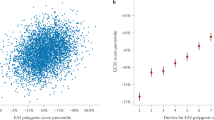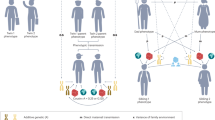Abstract
In light of the human genome project, establishing the genetic aetiology of complex human diseases has become a research priority within Western medicine. However, in addition to the identification of disease genes, numerous research projects are also being undertaken to identify genes contributing to the development of human behavioural characteristics, such as cognitive ability and criminal tendency. The permissibility of this research is obviously controversial: will society benefit from this research, or will it adversely affect our conceptions of ourselves and each other? When assessing the permissibility of this research, it is important to consider the nature and deterministic significance of behavioural genetic information. Whilst todate there has been much discussion and debate about the properties of genetic information per se and genetic determinism, this has not been applied to behavioural genetic research and its ethical implications. Therefore, this paper elucidates how behavioural genetic information can be distinguished from other types of genetic and non-genetic information and also synthesises the determinative significance of genetic factors for the development of human behavioural traits. Undertaking this analysis enables the ethical issues raised by this research to be debated in an appropriate context and indicates that separate policy considerations are warranted.
Similar content being viewed by others
REFERENCES
Alper, J.S. “Genes, Free Will, and Criminal Responsibility.” Social Science and Medicine 46 (1998): 1599–1611.
Alper, J.S. and J. Beckwith. “Genetic Fatalism and Social Policy: The Implications of Behavior Genetics Research.” Yale Journal of Biology and Medicine 66 (1993): 511–524.
Annas, G.J. “Privacy Rules For DNA Databanks: Protecting Coded Future Diaries.” JAMA 270 (1993): 2346–2350.
Annas, G.J., L.H. Glantz, and P.A. Roche. “Drafting the Genetic Privacy Act: Science, Policy and Practical Considerations.” Journal of Law, Medicine and Ethics 23 (1995): 360, 365.
Australian Law Reform Commission and Australian Health Ethics Committee. “Coming to Terms with Genetic Information.” In: Essentially Yours: The Protection of Human Genetic Information in Australia. ALRC Report No. 96, 2003, pp. 129–146.
Bailey, R.C. “Hereditarian Scientific Fallacies.” Genetica 99 (1997): 125–133.
Bayertz, K. “What's Special about Molecular Genetic Diagnostics?” Journal of Medicine and Philosophy 23 (1998): 247–254.
Beckwith, J. and J.S. Alper. “Reconsidering Genetic Antidiscrimination Legislation.” Journal of Law, Medicine and Ethics 26 (1998): 205–210.
Benjamin, J. “Genes for Human Personality Traits.” Science in Context 11 (1998): 357–362, 366.
Bouchard, T.J. and M. McGue. “Genetic and Environmental Influences on Human Psychological Differences.” Journal of Neurobiology 54 (2003): 4–45.
Buchanan, A., D.W. Brock, N. Daniels, and D. Wikler. From Chance to Choice: Genetics and Justice (Cambridge: Cambridge University Press, 2000).
Chorney, M.J., K. Chorney, N. Seese, M.J. Owen, J. Daniels, P. McGuffin, L.A. Thompson, D.K. Detterman, C. Benbow, D. Lubinski, T. Eley, and R. Plomin. “A Quantitative Trait Locus Associated with Cognitive Ability in Children.” Psychological Science 9 (1998): 159–166.
de Jong, H.L. “Genetic Determinism: How Not to Interpret Behavioral Genetics.” Theory and Psychology 10 (2000): 615–637.
Devlin, B., M. Daniels, and K. Roeder. “The Heritability of IQ.” Nature 388 (1997): 468–471.
Drew, A.P. “Genes and Human Behavior: The Emerging Paradigm.” Zygon 32 (1997): 41–50.
Fisher, P.J., D. Turic, N.M. Williams, P. McGuffin, P. Asherson, D. Ball, I. Craig, T. Eley, L. Hill, K. Chorney, M.J. Chorney, C.P. Benbow, D. Lubinski, R. Plomin, and M.J. Owen. “DNA Pooling Identifies QTLs on Chromosome 4 for General Cognitive Ability in Children.” Human Molecular Genetics 8 (1999): 915–922.
Fogle, T. “Information Metaphors and the Human Genome Project.” Perspectives in Biology and Medicine 38 (1995): 535–547.
Fukuyama, F. Our Posthuman Future: Consequences of the Biotechnology Revolution. New York: Farrar Straus & Giroux, 2002.
Galton, F. Hereditary Genius. London: Macmillan and Co., 1869.
Gostin, L.O. and J.G. Hodge. “Genetic Privacy and the Law: An End to Genetic Exceptionalism.” Jurimetrics 40 (1999): 21–58.
Gottesman, I.I. “Twins: En route to QTLs for Cognition.” Science 276 (1997): 1522–1523.
Green, R.M. and A.M. Thomas. “DNA: Five Distinguishing Features for Policy Analysis.” Harvard Journal of Law and Technology 11 (1998): 571–591.
Griffiths, P.E. and R.D. Gray. “Developmental Systems Theory and Evolutionary Explanation.” Journal of Philosophy 91 (1994): 277–304.
Griffiths, P.E. and R.D. Knight. “What is the Developmentalist Challenge?” Philosophy of Science 65 (1998): 253–258.
Hill, L., M.J. Chorney, D. Lubinski, L.A. Thompson, and R. Plomin. “A Quantitative Trait Locus Not Associated With Cognitive Ability in Children: A Failure to Replicate.” Psychological Science 13 (2002): 561–562.
Holm, S. “There is Nothing Special About Genetic Information.” In Genetic Information: Acquisition, Access and Control. Edited by A.K Thompson and R.F. Chadwick. 97–103. New York: Kluwer Academic, 1999.
Johnston, T. “The Persistence of Dichotomies in the Study of Behavioral Development.” Developmental Review 7 (1987): 149–182.
Kitcher, P. “Battling the Undead: How (and How Not) to Resist Genetic Determinism.” In Thinking about Evolution: Historical, Philosophical and Political Perspectives. Edited by R. Singh, C.B. Krimbas, D. Paul and J. Beatty. Cambridge: Cambridge University Press, 2001.
Lewontin, R.C. The Doctrine of DNA: Biology as Ideology. London: Penguin, 1993.
Maddox, J. “Genetics and Hereditable IQ.” Nature 309 (1984): 579.
McClearn, G.E. et al. “Substantial Genetic Influence on Cognitive Abilities in Twins 80 or More Years Old.” Science 276 (1997): 1560–1563.
Murray, T.H. “Genetic Exceptionalism and 'Future Diaries': Is Genetic Information Different from Other Medical Information?” In Genetic Secrets: Protecting Privacy and Confidentiality in the Genetic Era. Edited by M.A. Rothstein. 60–73. Yale: Yale University Press, 1997.
Nuffield Council on Bioethics. Genetics and Human Behaviour: The Ethical Context. London, 2002. Available at: http://www.nuffieldbioethics.org.
Oyama, S. The Ontogeny of Information. Cambridge: Cambridge University Press, 1985.
Petrill, S.A. et al. “Exploring the Genetic and Environmental Etiology of High General Cognitive Ability in Fourteen-to Thirty-Six-Month-Old Twins.” Child Development 69 (1998): 68–74.
Plomin, R. and J. Crabbe. “DNA.” Psychological Bulletin 126 (2000): 806–828.
Plomin, R., G.E. McClearn, D.L. Smith, S. Vignetti, M.J. Chorney, K. Chorney, C.P. Venditti, S. Kasarda, L.A. Thompson, D.K. Detterman et al. “DNA Markers Associated with High Versus Low IQ: The IQ Quantitative Trait Loci (QTL) Project.” Behavior Genetics 24 (1994): 107–118.
Plomin, R., J.C. DeFries, G.E. McClearn, and P. McGuffin. Behavioral Genetics, 4th edn. New York: Worth Publishers, 2001.
Richards, M. “How Distinctive is Genetic Information?” Studies in History and Philosophy of Biological and Biomedical Sciences 32C (2001): 663–687.
Robertson, J.A. Children of Choice: Freedom and the New Reproductive Technologies. Princeton: Princeton University Press, 1994.
Rothstein, M.A. “Behavioral Genetic Determinism: its Effects on Culture and Law.” In Behavioral Genetics: the Clash of Culture and Biology. Edited by R.A. Carson and M.A. Rothstein. 89–115. Baltimore: Johns Hopkins University Press, 1999.
Rutter, M. and R. Plomin. “Opportunities for Psychiatry from Genetic Findings.” British Journal of Psychiatry 171 (1997): 209–219.
Schaffner, K.F. “Genes, Behavior and Developmental Emergentism. One Process, Indivisible?” Philosophy of Science 65 (1998): 209–252.
Schouten, M.K.D. Memory Genes Knocked Out: Gene Manipulation as a Reduction Tool in Cognitive Neurobiology. Paper presented at the Society for Applied Philosophy Annual Conference, Manchester, United Kingdom 2000.
Strohman, R.C. “The Coming Kuhnian Revolution in Biology.” Nature Biotechnology 15 (1998): 194–200.
Stock, G. Redesigning Humans: Our Inevitable Genetic Future. New York: Houghton Mifflin, 2002.
Wachbroit, R. “The Question Not Asked: The Challenge of Pleiotropic Genetic Tests.” Kennedy Institute of Ethics Journal 8 (1998): 131–144.
Wheeler, M. and A. Clark. “Genetic Representation: Reconciling Content and Causal Complexity.” British Journal for the Philosophy of Science 50 (1999): 103–135.
Wolf, U. “The Genetic Contribution to the Phenotype.” Human Genetics 95 (1995): 127–148.
Author information
Authors and Affiliations
Rights and permissions
About this article
Cite this article
Newson, A. The Nature and Significance of Behavioural Genetic Information. Theor Med Bioeth 25, 89–111 (2004). https://doi.org/10.1023/B:META.0000033764.50604.85
Issue Date:
DOI: https://doi.org/10.1023/B:META.0000033764.50604.85




